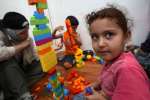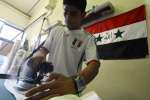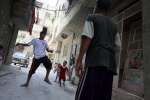"Hello Sweden – to feel home in a new country"
News Stories, 8 July 2014
Stockholm, Sweden, July 8 (UNHCR) – School children in Sweden are seeing the world through new eyes – the eyes of refugees, thanks to a groundbreaking UNHCR educational project that aims to combat intolerance.
'Hello Sweden', conducted in cooperation with the anti-bullying organization 'Friends' and funded by the Swedish Postcode Lottery, offers schools a short movie, a comic book and a stage play that convey the experiences of unaccompanied refugee children in Sweden. With one third of all secondary schools in the country ordering materials, the project has been a big success, appearing on the European Commission website as an example of good integration practice.
At a secondary school in a middle class suburb of Stockholm, students who have seen the play about a girl who flees her war torn homeland for Sweden find that they can relate to her plight. "Even though the play is about an unaccompanied refugee girl, you do not have to be a refugee to understand what it feels like to be alone, not knowing anybody," says Edvin, one of the students. "It has to be twice as hard to come from another country and not know the language."
For students at this school, the play strikes a personal chord following the recent arrival of three Syrian refugee boys. One of their classmates, William, feels encouraged to help them fit in. "We cannot communicate with words, so we do it through football," he says. "One of the boys got really happy when he scored. He smiled and I smiled back, and we connected, so now we try to talk and he has actually already learned the words 'free kick' and goal'."
And this is just one school. Across Sweden, the play has been shown in 170 schools and theatres to 16,000 students. A further 92,000 parents have received a 'Hello Sweden' information leaflet.
The 'Hello Sweden' campaign comes at a crucial moment in time, as the number of refugees seeking asylum in the country rises and anti-immigrant sentiment takes hold in Europe. In an attempt to boost awareness, UNHCR is now working to export the project to other countries.
The hope is that it will not only create solidarity and equality in the schoolyard, but in the local community and society as a whole. As Agnes, one of the students, says: "You cannot do everything, but everybody can do something for somebody else. Small things can make big changes."
Lisa van Hogerlinden in Stockholm













































